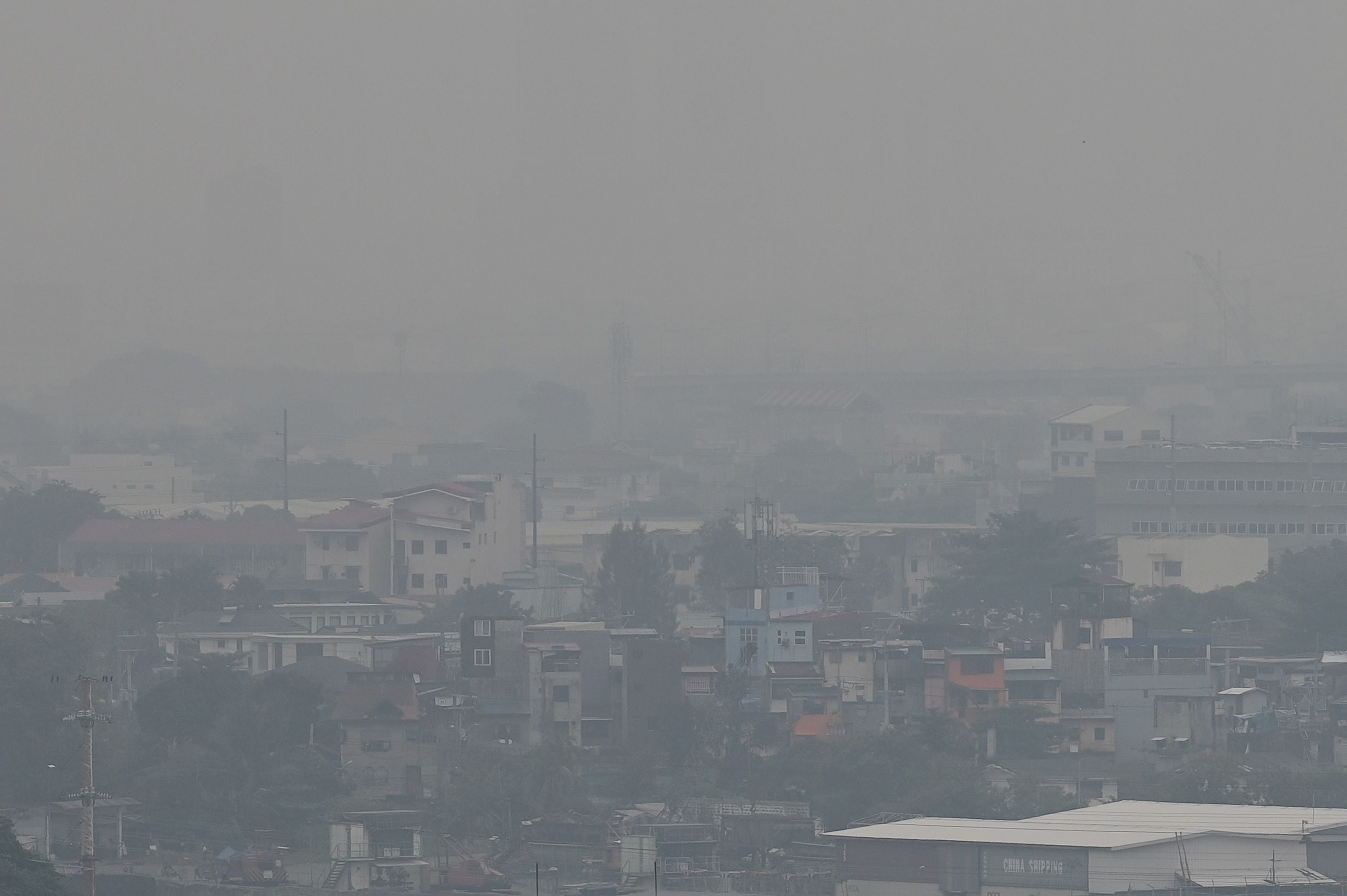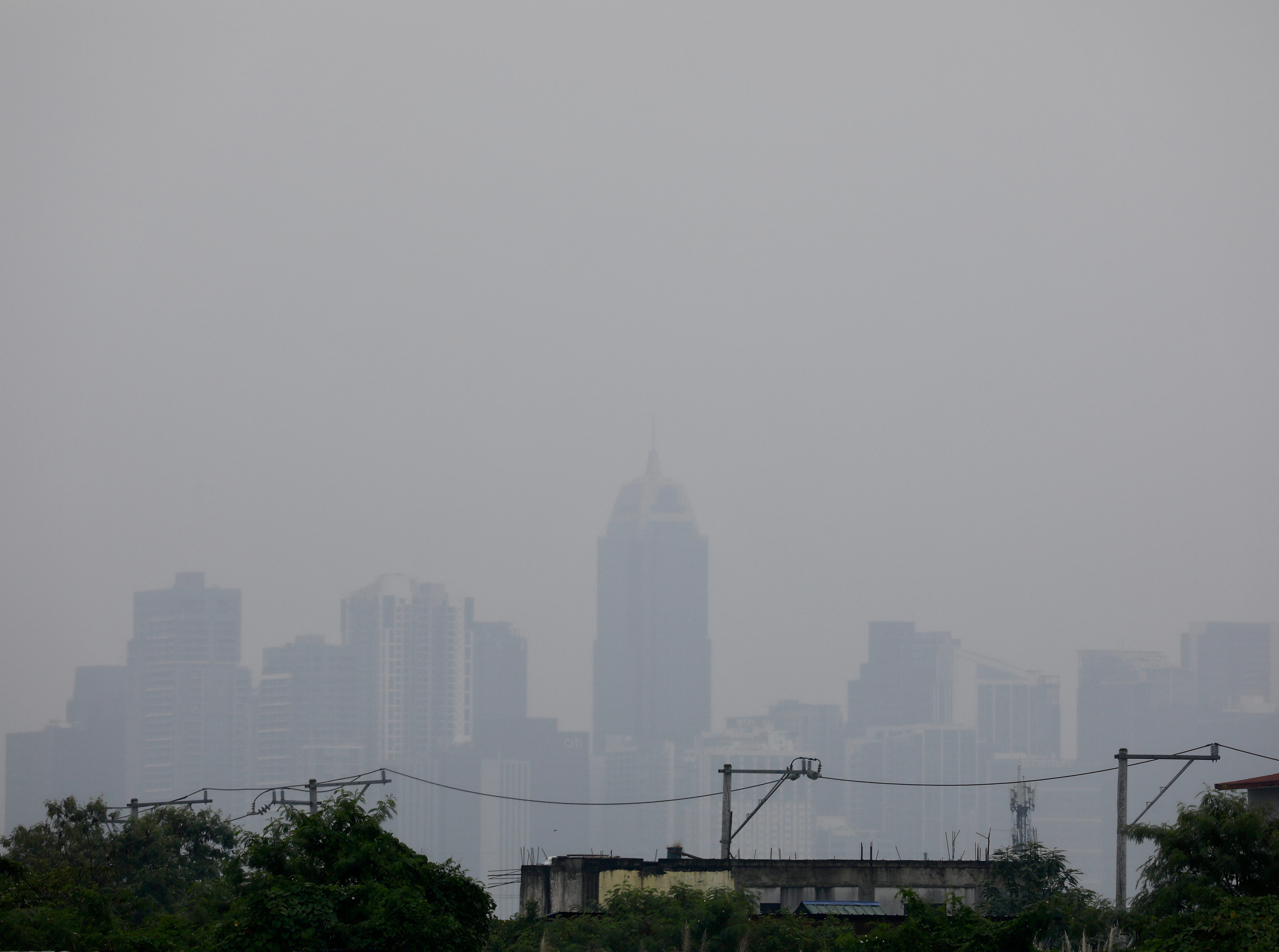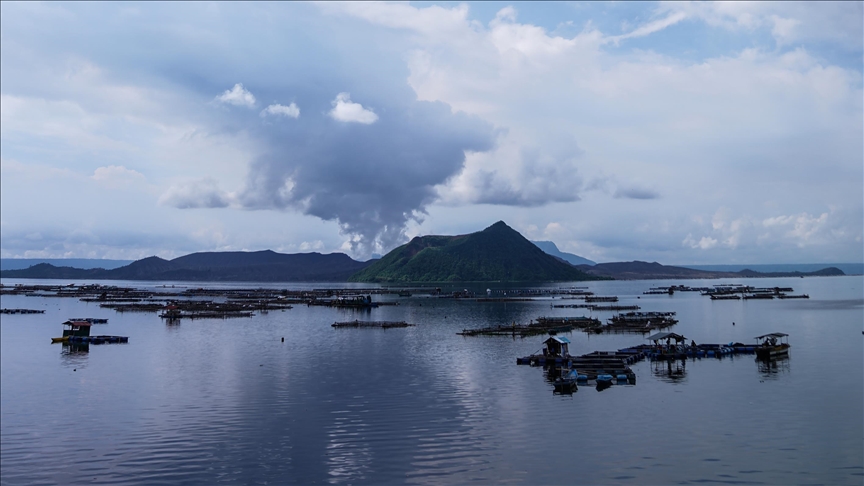Resident told to mask up in affected areas as schools forced to close
Neil Jerome Morales
4 days ago

The Manila skyline is seen shrouded in smog
(AFP via Getty Images)
Volcanic smog has blanketed the Philippine capital Manila and nearby provinces, with residents urged to stay indoors and schools forced to close.
Taal, a small but restive volcano near the capital, spewed above-average sulfur dioxide and volcanic smog on Friday, prompting authorities to issue a health warning and urge residents in affected areas to mask up.
The state volcanology and seismology institute said it observed upwelling of hot volcanic fluids in the Taal volcano‘s crater lake, resulting in the emission of volcanic gases.
The health alert sits at level 1 on a five-level scale, denoting a “slight increase in volcanic earthquake, and steam or gas activity”.

An airplane flies on a sky shrouded with smog in Taguig city, Philippines
(EPA)
Located in a scenic lake in Batangas province near Manila, the 311-metre (1,020-foot) Taal is among the most active of 24 volcanoes in the Philippines.
In January 2020, it spewed a column of ash and steam 9.32 miles high, forcing more than 100,000 people to evacuate and dozens of flight cancellations as heavy ash fell as far away as Manila.
“We have reports of respiratory illnesses in Batangas province due to intoxication from the volcanic smog,” Randy Dela Paz, operations section chief at the civil defence’s southern Manila office, told DWPM radio.
The Philippine Institute of Volcanology and Seismology director Teresito Bacolcol told The Manila Times the current smog should not be a cause for residents to panic as the alert level is low, but said people in affected areas to be vigilant and wear masks when they smell the smog.

Smog covers Metro Manila and nearby provinces
(EPA)
Volcanic smog, or vog, consists of fine droplets containing volcanic gas like sulfur that can cause irritation of the eyes, throat and respiratory tract.
Authorities suspended Friday classes in dozens of towns and cities in the Cavite, Laguna, and Batangas provinces adjacent to Taal volcano, and in five cities in the capital region.
The aviation authority on Friday told pilots to avoid flying close to the volcano‘s summit “as airborne ash and ballistic fragments from sudden explosions may pose hazards to aircrafts”.
The Philippines is in the Pacific “Ring of Fire,” where volcanic activity and earthquakes are common.
Taal Volcano’s smog blanket southwest Philippines province, with possibility of acid rain
Satellite detects large cloud of SO2 over and expanding west of Taal Lake, near volcano in Batanga province, Science Ministry says, advising people to limit their exposure to gas
Satellite detects large cloud of SO2 over and expanding west of Taal Lake, near volcano in Batanga province, Science Ministry says, advising people to limit their exposure to gas
Esra Tekin |22.09.2023


Smoke rise from Taal volcano in Batangas, Philippines on July 05, 2021.
( Dante Dennis Diosina Jr. - Anadolu Agency )
ISTANBUL
The sulfur dioxide level at the Philippines' Taal Volcano has increased, causing constant volcanic smog and the possibility of acid rain, the country's Science and Technology Ministry said on Friday.
“A total of 4,569 tons/day of volcanic sulfur dioxide or SO2 gas emission from the Taal Main Crater was also measured today, 21 September 2023,” said the ministry in a statement.
Satellite monitors detected a large cloud of SO2 over and expanding west of Taal Lake, which is near the volcano in the Philippines' Batanga province, the ministry said, advising people to limit their exposure to the gas and protect themselves.
Taal Volcano is currently on Alert Level 1, indicating an abnormal state, the statement said.
Acid rain may form when there is rainfall concurrent with the release of volcanic gases in regions where the plume spreads, which can harm crops and cause corrosion of metal roofs on homes and structures.
This status should not be interpreted as a cessation of unrest or the removal of the threat of eruptive activity, the statement said.
“As a reminder, vog consists of fine droplets containing volcanic gas such as SO2, which is acidic and can cause irritation of the eyes, throat, and respiratory tract with severities depending on the gas concentrations and durations of exposure,” it added.
ISTANBUL
The sulfur dioxide level at the Philippines' Taal Volcano has increased, causing constant volcanic smog and the possibility of acid rain, the country's Science and Technology Ministry said on Friday.
“A total of 4,569 tons/day of volcanic sulfur dioxide or SO2 gas emission from the Taal Main Crater was also measured today, 21 September 2023,” said the ministry in a statement.
Satellite monitors detected a large cloud of SO2 over and expanding west of Taal Lake, which is near the volcano in the Philippines' Batanga province, the ministry said, advising people to limit their exposure to the gas and protect themselves.
Taal Volcano is currently on Alert Level 1, indicating an abnormal state, the statement said.
Acid rain may form when there is rainfall concurrent with the release of volcanic gases in regions where the plume spreads, which can harm crops and cause corrosion of metal roofs on homes and structures.
This status should not be interpreted as a cessation of unrest or the removal of the threat of eruptive activity, the statement said.
“As a reminder, vog consists of fine droplets containing volcanic gas such as SO2, which is acidic and can cause irritation of the eyes, throat, and respiratory tract with severities depending on the gas concentrations and durations of exposure,” it added.
No comments:
Post a Comment